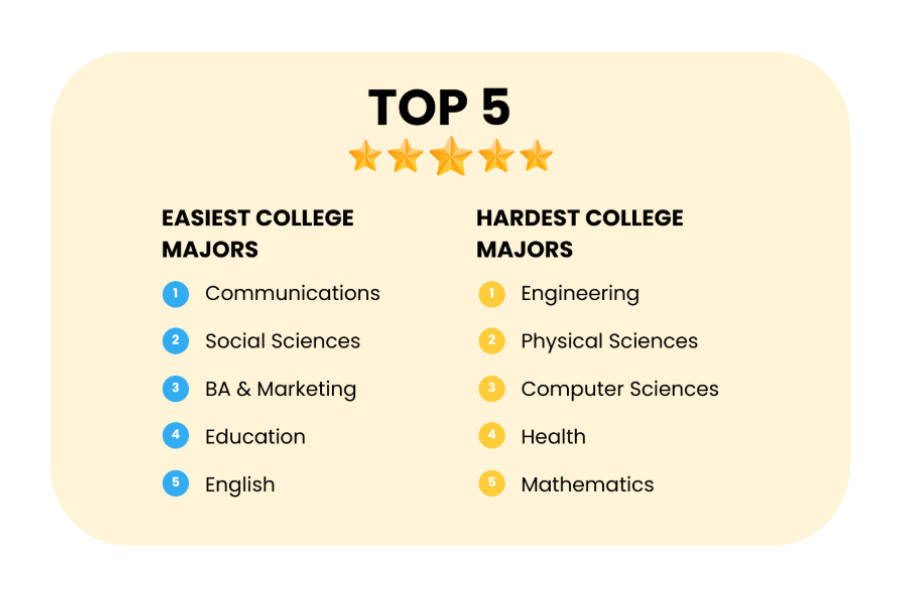CChoosing majors in college is a challenge for any student. If you’re reading this, we’re guessing you understand the seriousness and consequences of this decision. Custom-writing experts have compiled the following list of top 10 easiest and hardest college majors throughout the country.
Check out our list of college degrees to find the easiest and the most difficult majors!

🍸 Easiest College Majors for the Undecided
Though an easy major doesn’t guarantee successful employment, at least you’ll have more time to enjoy your college years with minimal hours of assigned reading per week.
- Communications, Journalism, and Advertising. This category is guaranteed to be free of brain-crunching lab work and mathematics. It truly is the easiest college route to take! Also, note that the average salary for this field is $60,000.
- Social Sciences. Despite requiring some Math and Statistics, it’s nothing compared to what Chemistry and Engineering students have to go through. The only disadvantage is that you’ll have lots of writing assignments. The average salary of a social scientist is $74,000.
- Business Administration and Marketing. What’s fun about this track is that students get to write proposals for startup ideas, allowing them to see how the theoretical principles they learn are used in practice. In the US, the average business analyst salary is almost $70,000. This makes Business Administration both one of the easiest and most lucrative college majors available.
- Education. Learning how to teach is genuinely exciting for those with a passion for it, and it doesn’t require too much in the way of STEM. Given Education’s focus on spending time in the classroom to gain valuable teaching experience, you won’t have to worry about pulling lonely all-nighters in the library. This makes it one of the easiest degrees to get, while still being fulfilling. The average salary for this field is $55,000.
- English. Spending four years studying a language you’ve been speaking your entire life (or at least half of it, if you’re an ESL student) is a fairly painless choice. The average salary of an English major is $55,000.
📖 Hardest College Majors for the Brave
The hardest college majors are those for which students typically spend more time preparing, studying, and training. The most challenging degrees are as follows:
- Engineering. The average number of weekly hours spent preparing for classes is 18.41. For the same reason, Engineering also has the highest dropout rates (up to 60% in some cases). With all the Chemistry, Calculus, Statistics, and Physics you’ll need to study, you’ll be lucky to walk away with a “C.” As any Engineering student will tell you, getting an “A” is rare.
- Physical Sciences. The average number of weekly hours spent preparing for classes is 18.62. Physics, Chemistry, Biology, and Geology fall into this category. You’ll practically need a photographic memory to remember all those Latin words and their meanings.
- Computer Sciences. The average number of weekly hours spent preparing for classes is 18.21. It will, however, pay off once you finally get your diploma. Your task is to stay alive and sane, spending the vast majority of your waking life studying.
- Health Professions. The average number of weekly hours spent preparing for classes is 17.98. Nursing students confess that at least 80% of their classes are challenging and give them no time to relax. But at least we can feel safe knowing that medical students owe it to their future patients to do well in school.
- Mathematics. The average number of weekly hours spent preparing for classes is 18.12. While many students are looking for majors that don’t require working with numbers (and beyond), this one makes brains boil.
What the hardest college majors lack in user-friendliness, they make up for in salary and gratification. Now, it’s time to weigh all the pros and cons and make your choice. Or have you already made one?
❗ How to Choose a Major: Main Factors to Consider
- Define your strengths. Make a list of things you can do well or at least enjoy doing. What classes are you good at? Divide them into general spheres, such as Arts, Language, Engineering, Sciences, Medicine, Psychology, etc. Such a visualization will indicate the domain that’s for you.
- Money is essential, but the deciding factors should be interest and talent. People who engage in activities that inspire them often manage to build a successful business. On the contrary, students who choose the hardest college majors with high pay for the mere sake of financial reward often suspend their studies, losing money and time in the process. Even the most stressful major can be intellectually stimulating for those talented in that specific domain.
- Choose between theory and practice. If you plan on developing yourself as a researcher or a professor, a theoretically oriented degree is the way to go. In all other cases, opt for the most practical courses, especially those offering internship placement.
- Some degrees are costly, but many of them offer scholarships based on GPA. If you’ve done well in school, scholarships could shave off years from the dreaded student loan repayment cycle. Keep in mind, too, that the priciness of an Ivy League university doesn’t guarantee a high quality of education.
- No major or bachelor’s degree guarantees a career. Search the web to understand what specialists are currently in demand and which ones will be in demand by the time you graduate. Though the statistics change every year, the general picture should give you an idea of what’s marketable and viable when it comes to a future profession.
- Imagine yourself five years after graduation. What does your typical day look like? Are you satisfied with the work you’re supposed to do? In the absence of answers to these questions, you’ll be learning blindly. Find a professional in your future sphere of expertise and don’t be afraid to pick their brain!

![3 Scholarship Essay Examples about Yourself [2026]](https://custom-writing.org/blog/wp-content/uploads/2020/12/closeup-hand-student-holding-pencil-284x153.jpg)





![Quieting Your Inner Critic – Self-Compassion and Other Methods [Guide for Students]](https://custom-writing.org/blog/wp-content/uploads/2024/03/side-view-woman-looking-up-1-284x153.jpg)




I would like to know if IT easy an easy major?
“Spending four years studying a language you’ve been speaking your entire life… is the laziest choice ever.” As an English major, I don’t take offense to this statement, but I disagree with it in its entirety. In the interest of dispelling this harmful stereotype, I’ll try to lay out a comprehensive defense of English majoring as best I can. Jack, I ask that you consider revising your original post in light of these insights.
First thing you ought to know about English is that it’s a far more multi-faceted degree than what your blog implies. Studying English isn’t just about honing one’s basic linguistic skills. Most English educations focus on literary analysis, or the break-down of culturally and/or intellectually significant works of literature such that new, valuable knowledge may be gleaned from these works and applied to real life. This process yields a multiplicity of invaluable products for the literary analyst; an enriched understanding of human nature and the surrounding world, an improved efficient reading and writing skills, and a sharpened argumentative prowess are just some of the endless potential products of a rigorous English education.
Endeavoring to devote one’s college education to these ends takes strength of altruistic character, especially given the anti-humanities stigma if today’s college-centric discourse. It takes cajones to major in English when seemingly everyone has jumped on the “liberal arts degrees are worthless” train. The mechanics of the degree itself, contrary to popular opinion, are also extraordinarily demanding. English is a degree that by definition centers around reading and writing. By the time they’ve graduated, students of a strong English education will probably have completed not only a bookshelf’s worth of reading material, but also a 40 – 70+ page portfolio of essays (and creative material for students emphasizing creative writing). English majors simply cannot slack off because they’re reading and writing all of the time. And both processes, when undergone properly, require extensive thought beyond the rudimentary act of absorbing or producing words on a page. There’s a reason not everyone “got” The Great Gatsby or To Kill a Mockingbird when they read such texts in high school – classic literature is f*cking hard to understand! Successful English majors don’t just put in the time to read and write the voluminous texts with which they interact. They put in extra hours to think critically about how they’re approaching the text in question. Even for the best English students, one five-page chapter in a Dostoyevsky novel can balloon into an hour-long rabbit hole of conspiracy theorizing if the chapter is nuanced, subtle, and/or self-contradictory enough. A ten-page paper can be similarly challenging if the paper itself covers a difficult subject. Hence, both a surface-level acknowledgment of the sheer volume of work done by English majors and a consideration of the surplus efforts necessary to accomplish this work refute the paradigm that English is an “easy” degree.
I hope that my thoughts have made sense thus far, and that any English majors, pre-majors, minors, or potential majors who feel attacked by the original post now have something to reassure them that their choice of major isn’t “lazy”. The same is true, I should point out, of nearly all of the degrees listed. I’m not qualified to defend an education degree, but I know that what makes a college degree a college degree is that it takes work, time commitment, and endurance. More importantly, whether you’re majoring in business or anthropology, your college education is what you make of it, both in terms of your material success and the deeper merits of an intellectually stimulating program. A sociology degree whose achievement brings the sociologist student a competitive GPA AND the joys of a worthwhile education is priceless compared to the average marks and lackluster personal development earned by a bored, unengaged business student.
Soapbox rant over. Thanks for anyone who made it all the way through. Jack, if you read my comment, by all means respond as you will… but please, for the love of Shakespeare, at least write something other than ‘majoring in English is the “laziest thing ever.”‘ Hasta luego.
Thank you very much for your feedback. We apologize to all who were offended by any statements written in this article. Our team will make all the necessary corrections to eliminate any bias or inappropriateness appeared here.
“I don’t take offense to this statement then creates a 7-page essay, jk”. You have serious problems with counting.
Anyway, the author of this article seems to have serious troubles understanding what “studying your native language” is all about. When you study your native language in a university, you do not study how to speak or spell it. That’s what you do in elementary school (or at least you are supposed to, although most native English speakers make lots of mistakes in spelling). That statement is as stupid as saying that studying geology is easy: well, everyone knows what a rock is.
I have degrees in linguistics and computer science, and I’m currently doing a PhD in computational linguistics. Both subjects had their easy and hard courses. In general, “soft” sciences are hard sciences with more unknown variables. The methodology is pretty much the same. The only difference is how exact results you get and how you can rationalize or prove them.
“I don’t take offense to this statement” then creates a 7 page essay, jk.
Totally agree with the article. I’m currently in nursing major, and I have no time to relax, no time for self care, no time for family and friends, stress out, and burned out. Had to study really hard in pre-nursing to get straight As for prerequisites to get into a nursing program. Then in nursing program I have lots of work (assignment, exams, lab, clinical rotations for 20 hours a week, and so on and so on) non-stop. I was in business administration before I switch to nursing and I can feel the difference in workload between the two. Anyway, I guess every major can be difficult depending on the person.
Need to start a career in regards to my work experience and education as of right now
Can you be a double major for both computer science and engineering?
Yea but you can just take software engineering or computer engineering which will be similar
Sure, you can!
This article is crazy biased. No degree is easy by any means. It might be easier to get a passing grade in social science or English classes than it is in math or engineering. In math or engineering, you either know the answer, or you don’t. In social sciences, you can be partially correct, and still get passing grades. Regardless of the major, you have to put a shit load of hours into your classes to get an A. I’m doing a social sciences degree, and I can tell you it is hard, but it is also subjective. It’s hard for me because I work my ass off and I have never had any grade lower than an A-. A degree is as hard as you make it.
Same. My friend is on his 4th year of engineering and I’m on my 3rd of sociology with an economics minor, and I can say for sure it’s all about the person’s conviction. It’s as hard as you make it. My friend gets Bs and studies all night and I get As by studying all night. But graduating with a C average in engineering is more desirable than an A average in sociology to potential employers. Why? Because who enjoys learning formulas more than reading Marxism lol
You have an A because it’s easy
Come study nursing or medicine, then u will know ur social science is child’s play. Then u will work ur ass up, and d best u still get is ”C”.
I completely agree with you I’m doing a double major in psychology and criminal justice which will get me 2 master degrees once I graduate. And after that law school this college stuff isn’t easy by any means at all.
Ironically put “It might be easier to get a passing grade in social science or English classes than it is in math or engineering.” – thanks for the laugh.
I’m pretty sure Engineering isn’t about knowing the answers but the method to get to the answers, and then the process to get to the answer.
No one’s saying that because some degrees are harder than others, that those in the easier degrees don’t work their butt off and it isn’t hard work.
this comment is crazy biased. what you say goes without saying.. but some degrees are objectively (much) harder than others. I know facts hurt feelings but for the love of God, it’s ok.
Lol, the difficulty of a major is 100% an opinion and not a fact. You tried though.
Lol facts??? Just look at the courses needed for the degree, some majors are harder than others, not only in uni, but in grade school too.
Calculations and number crunching start to disappear in advanced mathematics, enter proofs!
You kinda forgot about architecture. What you study and have to know might not be so hard to take, but we definitely the most hard-working, weeks of not sleeping to submit a project you’re not even finished. A lot of people drop out halfway through or need breaks. The physical and mental recovery takes a lot longer than the day or two you’re actually free in during each semester. They’re never enough.